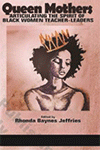
Queen Mothers
Articulating the Spirit of Black Women Teacher-Leaders
Edited by:
Rhonda Jeffries, University of South Carolina
Published 2019
Black women’s experiences functioning as mothers, teachers and leaders are confounding and complex. Queen Mothers from Ghanaian tradition are revered as the leaders of their matrilineal families and the teachers of the high chiefs (Müller, 2013; Stoeltje, 1997). Conversely, the influence of the British Queen Mother on Black women in the Americas translates as a powerless title of (dis)courtesy. Characterized as a deviant figure by colonialists, the Black Queen Mother’s role as disruptive agent was created by White domination of Black life (Masenya, 2014) and this branding persists among contemporary perceptions of Black women who function as the mother, teacher, or leader figure in various spaces. Nevertheless, Black women as cultural anomalies were suitable to mother others for centuries in their roles as chattel and domestic servants in the United States. Dill (2014), Lawson (2000), Lewis (1977) and Rodriguez (2016) provide explorations of the devaluation of Black women in roles of power with these effects wide-ranging from economic and family security, professional and business development, healthcare maintenance, political representation, spiritual enlightenment and educational achievement.
This text interrogates contexts where Black women function as Queen Mothers and contests the trivialization of their manifold contributions. The contributed chapters explore: The myriad experiences of Black women mothering, teaching and leading their children, families and communities; how spirituality has influenced the leadership styles of Black women as mothers and teachers; and how Black women are uniquely positioned to mother, teach, and lead in personal and professional spaces.
CONTENTS
Hail to the Queens: A Preface, Rhonda Baynes Jeffries. If Your Mother Is a Queen .. Teachable Moments on Leading and Living to Serve, Rhonda Baynes Jeffries. Black Women Intellectuals: Othering, Mothering, Resilience, and Madness, Robin Hughes, Lori Patton Davis, and Ronda C. Henry Anthony. Look on Me and Be Renewed: Black Mothers as Scholar-Activists in Teacher Education, Tambra Jackson and Natasha Flowers. “They Must Get It, They Must Learn”: Exploring Teaching as Community Mothering for a Multi- generational Mississippi Family of Black Women Teacher-Leaders, Brenda G. Harris and Cleveland Hayes. Reclaiming My Time: A Reflection of My Journey as a Black Woman in the Field, Kristal Moore Clemons. “How I Made It Over”: Tales of Triumph and Truth from Black Women Educators, Rebecca George and Alexanderia T. Smith. Narratives of Resistance: The Experiences of Black Women as Teachers, Leaders, Mothers, and Academics, Kerry-Ann Escayg, Alana Butler, Danita Webb, Tanya Murray, and Shelley Henderson. On the Process of Becoming: Black Women Academics Othermothering from the Margins, Daniella Cook and Gretchen Generett. We Feel Like Going On: Negotiating Troubled Waters Through “Spiritual Sistering, Crystal Hill Morton and Mercedes Cannon. Still Lifting As We Climb: Sisters of the Academy on Being Queen Mothers, Dannielle Davis, Denise Davis-Maye, Claudine Turner, and Kaye Thompson-Rogers. Queen Bey: A Visualyrical Investigation of Beyoncé as Feminist, Sex Symbol, Mother, and Activist, Devair Jeffries and Laura Waringer. Black Women in Leadership using Spirituality as a Buffer, M. Michelle Rosemond and Delila Owens. African American Women in the Civil Rights Movement, Coyet Greene. From Boys to Men: A Case Study of Black Mothers Successfully Launching Their Sons into College or Careers, Yasha Jones Becton. When Grandma is Your Mom: An Auto/Ethnography on Loss & Other-Mothering in One Caribbean-Canadian Family, Anita Jack-Davies. How Can I Be Like You? A Tri-Vocal Account of Intergenerational Mentoring and Queen Mothering, Gloria Boutte, Gwenda Greene, and Damara Hightower. Biographies.
-
Paperback978-1-64113-725-6
Web price: $45.04 (Reg. 52.99)
-
Hardcover978-1-64113-726-3
Web price: $80.74 (Reg. 94.99)
- eBook978-1-64113-727-0

- SOC001000 - SOCIAL SCIENCE: ETHNIC STUDIES: African American Studies
- SOC038000 - SOCIAL SCIENCE: Freemasonry & Secret Societies
- SOC032000 - SOCIAL SCIENCE: Gender Studies
-
 Black Girl Civics
Expanding and Navigating the Boundaries of Civic Engagement
Black Girl Civics
Expanding and Navigating the Boundaries of Civic Engagement
-
 Black Mother Educators
Advancing Praxis for Access, Equity, and Achievement
Black Mother Educators
Advancing Praxis for Access, Equity, and Achievement
-
 Black Women Mothering & Daughtering During a Dual Pandemic
Writing Our Backs
Black Women Mothering & Daughtering During a Dual Pandemic
Writing Our Backs
-
 Queering Public Health and Public Policy in the Deep South
Queering Public Health and Public Policy in the Deep South
-
 Rooted and Radiant
Women’s Narratives of Leadership
Rooted and Radiant
Women’s Narratives of Leadership
-
 Teaching for Citizenship in Urban Schools
Teaching for Citizenship in Urban Schools
-
 The Pursuit of Excellence
Kentucky State University, 1886-2020
The Pursuit of Excellence
Kentucky State University, 1886-2020

